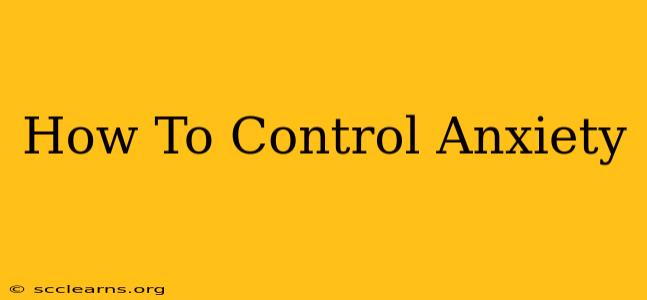Anxiety. That nagging feeling of unease, that knot in your stomach, the racing heart. It's something millions experience, and it can feel overwhelming. But the good news is, you can learn to control anxiety and live a more peaceful life. This guide offers practical strategies to help you manage your worries and reclaim your sense of calm.
Understanding Your Anxiety
Before we dive into solutions, it's crucial to understand what triggers your anxiety. Is it work-related stress? Social situations? Financial worries? Identifying your triggers is the first step toward effective management. Keep a journal to track your anxiety levels and note any patterns or contributing factors. This self-awareness is invaluable.
Common Anxiety Triggers:
- Stressful life events: Job loss, relationship problems, financial difficulties.
- Social situations: Public speaking, parties, meeting new people.
- Health concerns: Physical illness, fear of illness.
- Traumatic experiences: Past trauma can significantly impact anxiety levels.
- Substance use: Alcohol and drug use can exacerbate anxiety.
Practical Techniques to Control Anxiety
Once you understand your triggers, you can begin implementing strategies to manage your anxiety. These techniques are not a quick fix, but with consistent practice, they can significantly improve your well-being.
1. Mindfulness and Meditation:
Mindfulness involves focusing on the present moment without judgment. Meditation helps you quiet your mind and reduce racing thoughts. Even 5-10 minutes a day can make a difference. There are many guided meditation apps available to assist you.
2. Deep Breathing Exercises:
Deep, slow breaths activate your parasympathetic nervous system, which helps calm your body's stress response. Try the 4-7-8 technique: inhale for 4 seconds, hold for 7 seconds, and exhale for 8 seconds.
3. Regular Exercise:
Physical activity releases endorphins, which have mood-boosting effects. Aim for at least 30 minutes of moderate-intensity exercise most days of the week. Find activities you enjoy – whether it's walking, running, swimming, or dancing.
4. Healthy Diet and Sleep Hygiene:
What you eat and how well you sleep significantly impact your anxiety levels. Focus on a balanced diet rich in fruits, vegetables, and whole grains. Prioritize 7-9 hours of quality sleep per night. Establish a consistent sleep schedule to regulate your body's natural sleep-wake cycle.
5. Cognitive Behavioral Therapy (CBT):
CBT is a type of therapy that helps you identify and change negative thought patterns and behaviors that contribute to anxiety. A therapist can guide you through this process and provide personalized strategies.
6. Connect with Others:
Strong social connections provide support and a sense of belonging. Spend time with loved ones, join a social group, or volunteer in your community.
When to Seek Professional Help
While these techniques can be highly effective, it's important to know when to seek professional help. If your anxiety is severely impacting your daily life, interfering with your work or relationships, or causing significant distress, don't hesitate to consult a doctor or mental health professional. They can provide a proper diagnosis and recommend appropriate treatment options, including medication if necessary.
Remember: Managing anxiety is a journey, not a destination. Be patient with yourself, celebrate your progress, and don't be afraid to ask for support. You are not alone, and with the right tools and support, you can learn to control your anxiety and live a more fulfilling life.

